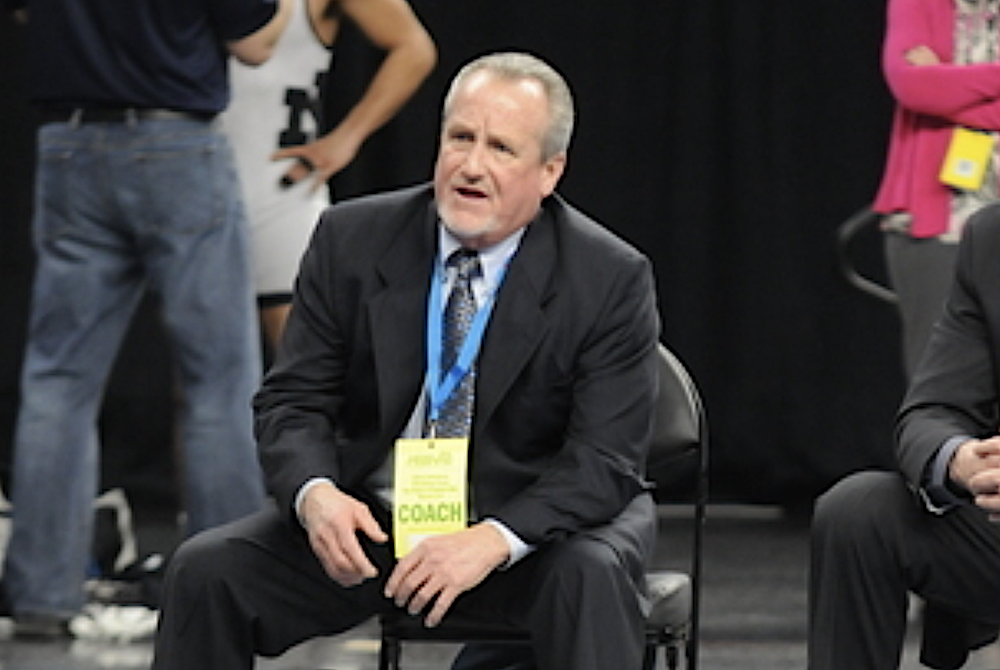
Bluhm Continues Building on Trenton Tradition in 5th Decade as Coach
By
Keith Dunlap
Special for MHSAA.com
December 22, 2022
TRENTON – What Tom Bluhm likes about wrestling also happens to correlate perfectly into what his program at Trenton has been about as of late.
 “It’s one-on-one,” Bluhm said. “You can’t hide and you can’t make excuses. That’s what I’ve always liked about it.”
“It’s one-on-one,” Bluhm said. “You can’t hide and you can’t make excuses. That’s what I’ve always liked about it.”
Excuses aren’t in the vocabulary of the Trenton program that’s been presided by Bluhm for going on 46 seasons.
Last season, the Trojans went 22-9, solid on the surface but incredible when considering Trenton had only 14 wrestlers on the team and forfeited just one weight class.
Again, Bluhm and his group weren’t interested in excuses. They just forged ahead with what they had.
“There’s no planning for it,” he said. “It’s just something that happens. It makes it tough to run practices. It’s not like you have a room of 30 or 40 guys where you can group them into three based on weight and get after it.”
Numbers haven’t traditionally been a problem for Trenton under Bluhm, who said his 1978 team had 100 wrestlers competing for spots on varsity and 50 freshmen.
In recent years, the lack of a program at the middle school level has negated opportunities to develop a feeder system, so Bluhm just hopes for the best when tryouts come around in November.
 Bluhm said it’s become an increasing scenario where athletes come out for the wrestling team who have never before wrestled in their lives.
Bluhm said it’s become an increasing scenario where athletes come out for the wrestling team who have never before wrestled in their lives.
Bluhm said one example was a sophomore who came out for the team last year, quickly learned the sport and ended up winning 36 matches.
“His mother supposedly called the AD last year saying he needed something to do because he was driving her crazy,” Bluhm said. “So he came out for wrestling.”
Nolan Diroff, a senior who primarily wrestles in the 189-pound weight class, but has also wrestled at higher weights, said the limited number of wrestlers on the team rarely comes up as a topic.
“I can’t really say that anybody has complained about not having a lot of people,” he said. “Nobody on the team complains when they get moved around in the lineup. We wrestle where Coach needs us to wrestle. We do whatever he says to try and win matches.”
Diroff said in a strange way, having a limited roster has made who is on the team better wrestlers because it has forced them to be versatile athletes who can compete at multiple weights.
“He’s kind of built us up to realize that and wrestle wherever he needs us,” he said. “He tries to get us as many matches as possible. It makes us better wrestlers and makes the team better.”
This year, there is a slight increase in the numbers.
Bluhm said there are 17 out for the team, including the first girl wrestler during his tenure.
“She fits right in,” Bluhm said. “She gets in there and does everything the boys do.”
Bluhm entered this season fourth on the MHSAA all-time coaching wins list for wrestling, carrying an 812-416-2 record with five seasons at Taylor Center before taking over at Trenton beginning with that 1977-78 winter.
Despite the struggles with numbers, Bluhm still very much gets a lot out of coaching after more than five decades.
He drives a little less than an hour to Trenton and back every day from his home in Northville, and said he’s stayed at Trenton out of his love and respect not only for the kids, but their parents.
“He tells a bunch of other stuff and random stories,” Diroff said. “Never ones that you really roll your eyes at. They are always enjoyable and shows you how long he’s been around.”
And when Trenton wrestles this season, the Trojans will do what they always do: Fight on with no excuses.
“I enjoy coaching,” Bluhm said. “I’ve always said show me some rules, and I’ll play.”
 Keith Dunlap has served in Detroit-area sports media for more than two decades, including as a sportswriter at the Oakland Press from 2001-16 primarily covering high school sports but also college and professional teams. His bylines also have appeared in USA Today, the Washington Post, the Detroit Free Press, the Houston Chronicle and the Boston Globe. He served as the administrator for the Oakland Activities Association’s website from 2017-2020. Contact him at [email protected] with story ideas for Oakland, Macomb and Wayne counties.
Keith Dunlap has served in Detroit-area sports media for more than two decades, including as a sportswriter at the Oakland Press from 2001-16 primarily covering high school sports but also college and professional teams. His bylines also have appeared in USA Today, the Washington Post, the Detroit Free Press, the Houston Chronicle and the Boston Globe. He served as the administrator for the Oakland Activities Association’s website from 2017-2020. Contact him at [email protected] with story ideas for Oakland, Macomb and Wayne counties.
PHOTOS (Top) Trenton wrestling coach Tom Bluhm coaches Connor Charping during the 2016 Individual Finals. (Middle) Bluhm and current wrestler Nolan Diroff stand in front of the program's record board. (Top photo by High School Sports Scene; middle photo courtesy of Nolan Diroff.)

Thank Roosevelt for Football Weekends
December 20, 2013
By Rob Kaminski
MHSAA benchmarks editor
The next time you find yourself immersed in a tense crosstown football rivalry on a Friday night followed by a Saturday pilgrimage to the nearest college campus and a Sunday afternoon with a remote and your favorite snacks and beverages, take a moment to consider what the weekend would be like if it weren’t for Teddy Roosevelt.
The man who became our 26th President shortly after the turn of the 20th Century following the assassination of William McKinley in 1901 was a football fan like you. Maybe more so.
Today’s game of football has reached a critical crossroads. Player size and speed have increased across the board. Savage use of equipment as weapons rather than protective gear has been glorified on television networks and social media. Leaders of the game at all levels have recognized the need for change, employing new rules and widespread educational efforts to aid in preserving the sport.
History, as they say, is repeating itself.
In an ironic twist, it was Roosevelt who saved the then-brutally violent game of football from itself more than 100 years ago. Yes, the same “Rough and Ready Teddy” who led the charge up San Juan Hill during the Spanish-American War and often sparred in the boxing ring while in office from 1901-09 opined that football was becoming so gruesome that he delivered an ultimatum: clean up the game or it would be outlawed.
The Chicago Tribune reported that in 1904 alone, there were 18 football deaths and 159 serious injuries, mostly among prep school players. Football deaths suffered by younger players were reported on a nearly weekly basis, as outraged citizens called on colleges and high schools to banish football outright.
In stepped Roosevelt, who called head coaches and representatives from Harvard, Yale and Princeton – college powers at the time – to the White House in 1905 urging them to eliminate excessive violence and set an example of fair play for the rest of the country. When the casualties actually rose by one during the ensuing season, Roosevelt reacted with greater resolve and convened leading football authorities for the purpose of authoring drastic rules changes. What emerged was an intercollegiate conference which was the predecessor of the NCAA.
Among the most effective changes for the 1906 season were the legalization of the forward pass, the elimination of mass formations, and the creation of a neutral zone. Football fatalities fell to 11 in each of the next two seasons, and severe injuries fell drastically.
Thanks to the introduction of protective equipment and ever-evolving rules changes, football during the 100-plus years to follow has become an exponentially safer game. Yet, the game’s leaders always will need to adjust and react to scrutiny that comes with the territory.
So, as the game once again undergoes rules modifications in the name of safety, give a tip of the cap to President Roosevelt while you enjoy college bowl season and the NFL playoffs and begin to think ahead to the first high school practice of 2014.

